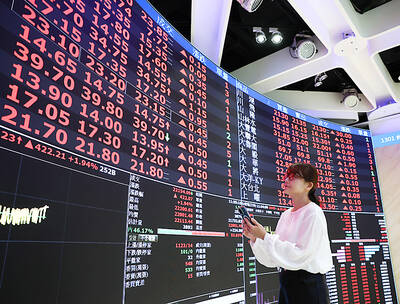China’s economic growth slowed to 9 percent in the third quarter as global financial woes started taking a toll, the government said yesterday, signalling it would respond with new stimulus measures.
It was the first time since late 2005 that quarterly growth slipped into single digits, providing the most powerful indication yet that China was not insulated from the international economic downturn.
“The growth rate of the world economy has slowed down noticeably. There are more uncertain and volatile factors in the international economic climate,” said Li Xiaochao (李曉超), spokesman of the National Bureau of Statistics.
“All these factors have started to release their negative impact on China’s economy,” Li told reporters in announcing the data.
As a result of the slowdown in the period from July to last month, growth in the world’s fourth-largest economy weakened to 9.9 percent over the first three quarters of the year.
This was down from 10.4 percent in the first half of this year and 12.2 percent in the first three quarters of last year.
“In China, any growth lower than 10 percent is a signal that the economy is getting sluggish, and that the outlook isn’t good,” said Ren Xianfang, a Beijing-based economist with consulting firm Global Insight.
The government signalled ahead of the release of the data that the need for new measures to boost growth had moved to the top of the policy-making agenda.
“There is the slowing trend in economic growth, the pace in the rise of corporate profits and fiscal revenue are falling, and the capital markets continue to swing and be sluggish,” it said on Sunday in a summary of a Cabinet meeting chaired by Premier Wen Jiabao (溫家寶).
The meeting, held on Friday, agreed on pro-growth measures such as support of home-buying and a cut in the tax on residential housing transactions, the statement said.
They also agreed on raising export tax rebates to ensure stable export growth, it said.
China’s trade surplus for the first nine months of the year reached US$180.9 billion, down 2.6 percent year-on-year, the customs administration said earlier.
Confirming the trend for a slowdown in the heavily export-dependent economy, industrial output growth was 15.2 percent in the first three quarters of this year, down from 16.3 percent in the first half, the statistics bureau said.
For last month alone, industrial output growth was 11.4 percent, it said.
As exports are slowing, China has looked to other sources of growth, particularly domestic investment and consumption.

UNCERTAINTIES: Exports surged 34.1% and private investment grew 7.03% to outpace expectations in the first half, although US tariffs could stall momentum The Chung-Hua Institution for Economic Research (CIER, 中華經濟研究院) yesterday raised its GDP growth forecast to 3.05 percent this year on a robust first-half performance, but warned that US tariff threats and external uncertainty could stall momentum in the second half of the year. “The first half proved exceptionally strong, allowing room for optimism,” CIER president Lien Hsien-ming (連賢明) said. “But the growth momentum may slow moving forward due to US tariffs.” The tariff threat poses definite downside risks, although the scale of the impact remains unclear given the unpredictability of US President Donald Trump’s policies, Lien said. Despite the headwinds, Taiwan is likely

READY TO BUY: Shortly after Nvidia announced the approval, Chinese firms scrambled to order the H20 GPUs, which the company must send to the US government for approval Nvidia Corp chief executive officer Jensen Huang (黃仁勳) late on Monday said the technology giant has won approval from US President Donald Trump’s administration to sell its advanced H20 graphics processing units (GPUs) used to develop artificial intelligence (AI) to China. The news came in a company blog post late on Monday and Huang also spoke about the coup on China’s state-run China Global Television Network in remarks shown on X. “The US government has assured Nvidia that licenses will be granted, and Nvidia hopes to start deliveries soon,” the post said. “Today, I’m announcing that the US government has approved for us

When Lika Megreladze was a child, life in her native western Georgian region of Guria revolved around tea. Her mother worked for decades as a scientist at the Soviet Union’s Institute of Tea and Subtropical Crops in the village of Anaseuli, Georgia, perfecting cultivation methods for a Georgian tea industry that supplied the bulk of the vast communist state’s brews. “When I was a child, this was only my mum’s workplace. Only later I realized that it was something big,” she said. Now, the institute lies abandoned. Yellowed papers are strewn around its decaying corridors, and a statue of Soviet founder Vladimir Lenin

The National Stabilization Fund (NSF, 國安基金) is to continue supporting local shares, as uncertainties in international politics and the economy could affect Taiwanese industries’ global deployment and corporate profits, as well as affect stock movement and investor confidence, the Ministry of Finance said in a statement yesterday. The NT$500 billion (US$17.1 billion) fund would remain active in the stock market as the US’ tariff measures have not yet been fully finalized, which would drive international capital flows and global supply chain restructuring, the ministry said after the a meeting of the fund’s steering committee. Along with ongoing geopolitical risks and an unfavorable